Mycotoxins represent a growing global challenge that endangers human and animal health. These toxins are present at all stages of the animal production cycle: from the field, through the transport and storage of raw materials and feeds, to food products for the final consumer. In spite of the application of good practices in the agri-food chain, low levels of mycotoxins can be found in raw materials and feeds. The exposure of mycotoxins produces harmful effects on animal health like intestinal disorders, damage to target organs, immunosuppression and cellular oxidative stress, which lead to a decrease in animal performance, causing severe economic losses. In addition, different studies show that exposure to multiple mycotoxins simultaneously increases their toxicity synergistically. At the same time, recent scientific research continuously extends the list of new dangerous mycotoxins, classified as emerging or modified according to their nature, which aggravates the complexity of the scenarios presented by regulated mycotoxins.
Hence, taking into account that multi-contamination is the most recurrent scenario, it is essential to apply a comprehensive strategy to face the challenge of mycotoxins and mitigate their impact on animal production. A fundamental part of the mycotoxin risk management plan is the diet supplementation with anti-mycotoxins agents, which combine adsorbent materials, phytogenic compounds and yeast products, for an effective protection against the most prevalent mycotoxins and other toxins.
BIŌNTE® QUIMITŌX® PLUS is a triple action anti-mycotoxins solution. Due to its unique combination of ingredients, the product provides three modes of action: adsorption, bioprotection and post-biotic effect; that provide an effective, selective and fast-acting response in the animal.
Validated efficacy against regulated mycotoxins
BIŌNTE® QUIMITŌX® PLUS contains selected high-performance adsorbent materials that guarantee the efficacy against a wide spectrum of mycotoxins, including the most dangerous and prevalent mycotoxins in animal nutrition: fumonisins (FB1, FB2, FB3), aflatoxins (AFB1, AFB2, AFG1, AFG2), sterigmatocystin (STC), zearalenone (ZEN), ochratoxin A (OTA), mycotoxin T-2 y HT-2. Figures 1, 2 and 3 show the results of the in vitro study carried out by Trilogy Laboratory (MO, USA) evaluating the efficacy of BIŌNTE® QUIMITŌX® PLUS against different mycotoxins. The incubations were conducted for 1h at 37ºC and at pH 3 and pH 6 in order to simulate the gastrointestinal tract conditions of the animal.
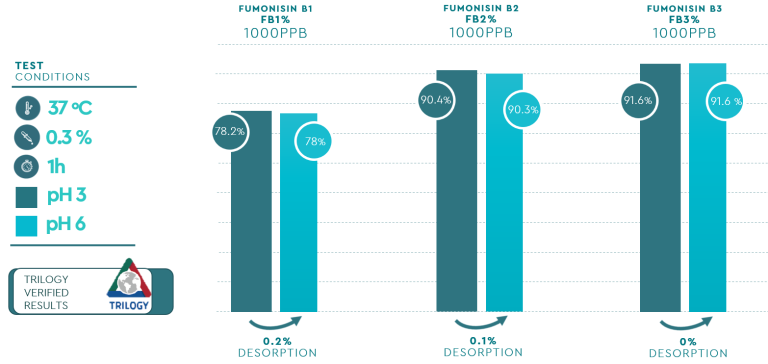
Figure 1. In vitro efficacy of BIŌNTE® QUIMITŌX® PLUS against fumonisins.
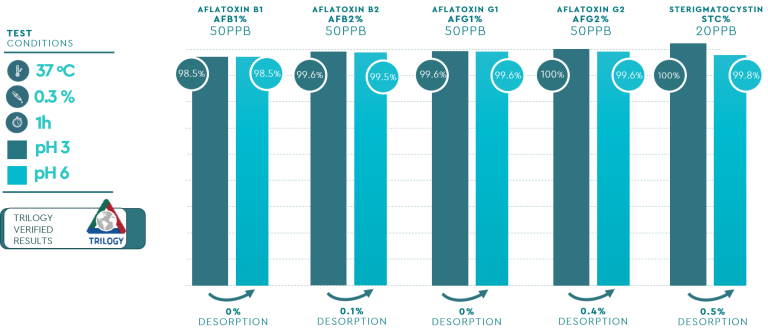
Figure 2. In vitro efficacy of BIŌNTE® QUIMITŌX® PLUS against aflatoxins and sterigmatocystin.
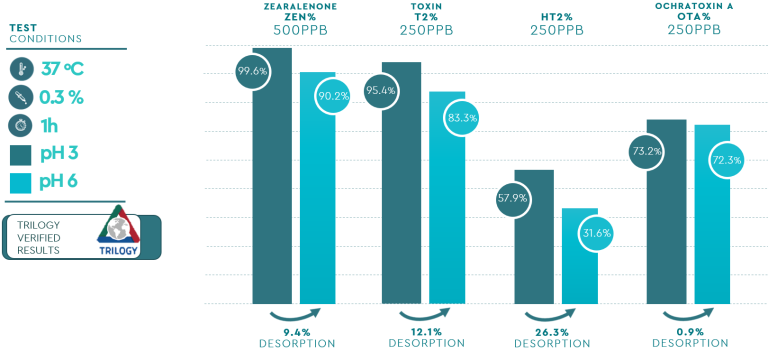
Figure 3. In vitro efficacy of BIŌNTE® QUIMITŌX® PLUS against ZEN, OTA, T-2 and HT-2 mycotoxins.
Results demonstrate that BIŌNTE® QUIMITŌX® PLUS is able to completely adsorb (>90%) FB2, FB3, AFB1, AFB2, AFG1, AFG2, STC, ZEN and T-2 at pH 3. Moreover, the adsorption of FB1 (78.2%), OTA (73.2%) and HT-2 (57.9%) is considered very high in stomach simulation conditions tested. At intestinal level, the efficacy of BIŌNTE® QUIMITŌX® PLUS is excellent for FB2, FB3, AFB1, AFB2, AFG1, AFG2, STC and ZEN (> 90%); high for T-2 (83.3%), FB1 and OTA (>73%); and good for HT-2 (31.6%), tested at pH 6. Furthermore, the product is characterized by low levels of desorption.
Therefore, BIŌNTE® QUIMITŌX® PLUS is a product with a scientifically demonstrated high-efficacy against the most dangerous and prevalent mycotoxins in animal nutrition: FB1, FB2, FB3, AFB1, AFB2, AFG1, AFG2, STC, ZEN, OTA, T-2 and HT-2.
Bioprotection: an innovative strategy to mitigate deoxynivalenol (DON)
DON is one of the most common mycotoxins in cereals and their by-products worldwide (EFSA, 2013; Gruber-Dorninger et al. 2019). Exposure to DON induces oxidative stress at the cellular level, immunosuppression, damage to the intestinal barrier, and reduced animal performance (Mishra et al., 2014).
In these situations, the use of phytogenic ingredients is especially interesting because of their wide range of beneficial effects. In order to mitigate the negative effects of mycotoxins, BIŌNTE® QUIMITŌX® PLUS includes in its formula bioactive extracts rich in silymarin (silibin, > 80%) and curcumin (total curcuminoids, > 90%).
In order to validate the efficacy of BIŌNTE® QUIMITŌX® PLUS in mitigating DON, an assay of dichlorodihydrofluorescein diacetate (H2-DCFDA) has been performed to test the effect of the product in reducing cellular oxidative stress (ROS) induced by DON in liver cells (HepG2). The study was carried out in collaboration with the University of Valencia and the results are resumed in figure 4.
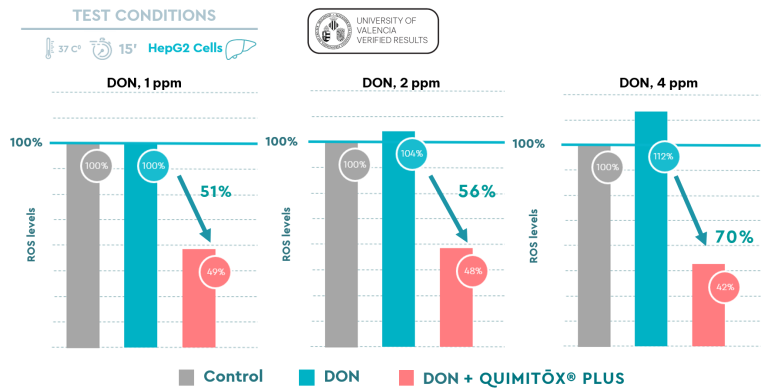
Figure 4. In vitro efficacy of BIŌNTE® QUIMITŌX® PLUS in mitigating ROS induced by DON in liver cells HepG2.
BIŌNTE® QUIMITŌX® PLUS demonstrated to alleviate oxidative stress induced by DON, reducing the ROS production in liver cells by more than 50%. This effect is attributed to the powerful antioxidant effect provided by the combination of the active ingredients silymarin and curcumin.
Wide spectrum of action: protection against emerging and modified mycotoxins
In addition to regulated mycotoxins, it is important to be aware of the occurrence of emerging mycotoxins, such as beauvericin and enniatins A, A1, B, B1, and modified mycotoxins, altered by the metabolism of plants, fungi and animals. These groups of mycotoxins are not routinely determined in raw materials and/or feeds, for that reason, they can go unnoticed. Nevertheless, the challenge that they represent to the agri-food sector should not be underestimated because of their high toxicity to productive animals. Among the harmful effects caused by emerging and modified mycotoxins, liver damage, oxidative stress and intestinal disruption stand out; which, in consequence, lead to a reduction in production performance. Furthermore, the ingestion of feed contaminated by mycotoxins without the application of preventive strategies, can produce a carry-over effect on animal-derived food products, threatening human health.
A collaboration study with the Biotech Agrifood Laboratory of the University of Valencia (Spain) was conducted in order to demonstrate the efficacy of BIŌNTE® QUIMITŌX® PLUS against emerging mycotoxins such as beauvericin and different enniatins, as well as the modified mycotoxin ZEN-14-glucoronide.
The study simulated the gastrointestinal tract conditions at pH 3, as stomach conditions, and at pH 6, as intestine conditions. The results of the evaluation are shown in figure 5.
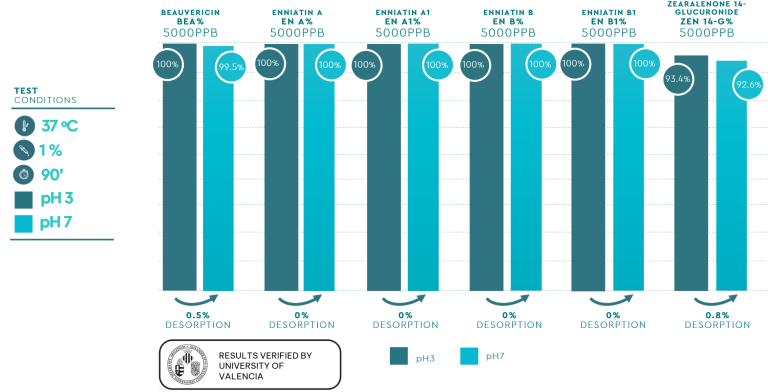
Figure 5. In vitro efficacy of BIŌNTE® QUIMITŌX® PLUS against emerging and modified mycotoxins.
The results show that the BIŌNTE® QUIMITŌX® PLUS has an excellent efficacy against the emerging mycotoxins evaluated: beauvericin, enniatin A, enniatin A1, enniatin B, enniatin B1. Regarding to ZEN-14-glucoronide, the efficacy of BIŌNTE® QUIMITŌX® PLUS was very high: 93.4% at pH 3 and 92.6% at pH 6.
Anti-endotoxin activity of BIŌNTE® QUIMITŌX® PLUS
Endotoxins, also known as lipopolysaccharides, are the main component of the outer membrane of the cell wall of Gram-negative bacteria. The gastrointestinal tract contains billions of commensal bacteria, for that reason, endotoxins are always present in the intestine (Reisingeret al., 2016). Moreover, the exposure to mycotoxins potentiates the toxic effect of endotoxins. Mycotoxins disrupt intestinal integrity and promote the translocation of endotoxins into the blood stream. At the circulatory level, endotoxins generate a strong inflammatory response which is enhanced by the presence of mycotoxins (Ren et al., 2019). For that reason, the simultaneous adsorption of mycotoxins and endotoxins mitigates the synergistic negative effect of both toxins.
To counteract endotoxins in animal nutrition, one of the main strategies is the use of aditives with binding capacity in the gastrointestinal tract, in order to reduce their bioavailability. BIŌNTE® QUIMITŌX® PLUS contains a mixture of selected yeast products with a post-biotic effect capable of mitigating endotoxins. The yeast cell wall and the hydrolyzed yeast of BIŌNTE® QUIMITŌX® PLUS are rich in mannan-oligosaccharides (MOS) which provide toxin agglutination properties, in addition to an immunostimulating and modulating effect on the intestinal microbiota (see figure 6).
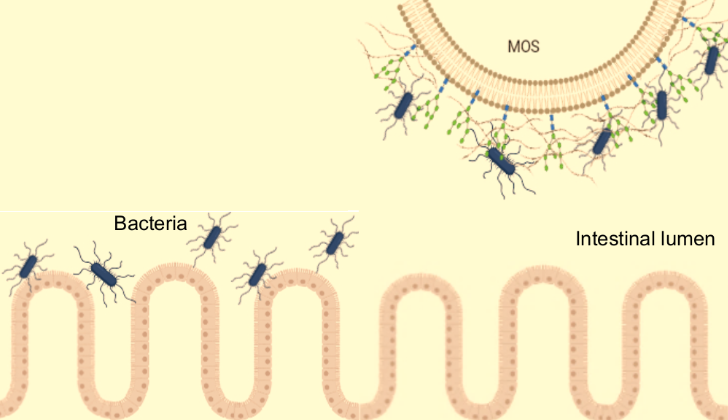
Figure 6. Mechanism of endotoxin agglutination by mannan-oligosaccharides (MOS) from yeast products.
With the aim to evaluate the binding capacity of BIŌNTE® QUIMITŌX® PLUS against endotoxins from Salmonella spp. and E. coli, an in vitro study was carried out in collaboration with Molendotech Ltd. laboratories (United Kingdom). Figure 7 shows the endotoxin adsorption results of BIŌNTE® QUIMITŌX® PLUS.
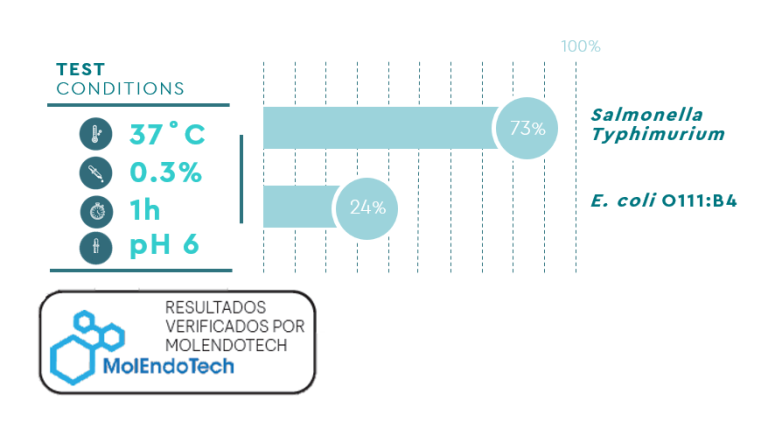
Figure 7. In vitro efficacy of BIŌNTE® QUIMITŌX® PLUS against endotoxins from Salmonella spp. and E. coli.
BIŌNTE® QUIMITŌX® PLUS binds 73% of the endotoxins of Salmonella spp. and 24% of the endotoxins of E. coli. The results demonstrate that BIŌNTE® QUIMITŌX® PLUS simultaneously adsorbs mycotoxins and endotoxins, avoiding their synergistic potential, thus protecting animal health.
Conclusion
The scientific studies evidenced demonstrate the capacity of BIŌNTE® QUIMITŌX® PLUS to only mitigate the effects of the most dangerous and prevalent mycotoxins, but also the effects of emerging and modified mycotoxins, and endotoxins.
These effects are attributed to the unique ingredients of the anti-mycotoxin solution BIŌNTE® QUIMITŌX® PLUS: high-performance adsorbent materials, bioactive phytogenics and selected yeast with post-biotic effect.


